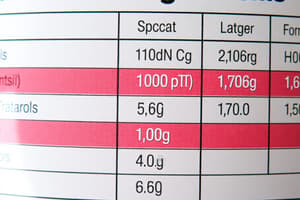Podcast
Questions and Answers
What is the recommended daily percentage of carbohydrates in a 2000 Cal diet?
What is the recommended daily percentage of carbohydrates in a 2000 Cal diet?
- 20-35%
- 10-35%
- 30-40%
- 45-65% (correct)
Which vitamin is primarily involved in collagen synthesis and boosting immune function?
Which vitamin is primarily involved in collagen synthesis and boosting immune function?
- Vitamin B12
- Vitamin E
- Vitamin C (correct)
- Vitamin D
Which nutrient is considered a macronutrient that provides 9 Cal/g?
Which nutrient is considered a macronutrient that provides 9 Cal/g?
- Vitamins
- Fats (correct)
- Carbohydrates
- Proteins
What is the primary function of minerals in the body?
What is the primary function of minerals in the body?
Which trace mineral is essential for oxygen transportation in the body?
Which trace mineral is essential for oxygen transportation in the body?
Which of the following is a function of calcium in the body?
Which of the following is a function of calcium in the body?
Which of the following dietary suggestions is a key message from Canada's Food Guide?
Which of the following dietary suggestions is a key message from Canada's Food Guide?
Study Notes
Essential Nutrients
- Essential nutrients are categorized as macronutrients and micronutrients.
- Macronutrients include carbohydrates, fats, and proteins.
- Micronutrients include vitamins and minerals.
Recommended Nutrient Intake
- Carbohydrates should make up 45-65% of daily diet.
- Proteins should make up 10-35% of daily diet.
- Fats should make up 20-35% of daily diet.
- For a 2000 calorie diet, carbohydrates should comprise 250g/day, proteins 100g/day, and fats 66.7g/day.
- Saturated fat intake should be limited to less than 200 calories or 22.2g/day.
Vitamins
- Vitamins are organic substances that regulate growth, metabolism, and various bodily functions.
- They are not a direct source of energy.
- There are 13 essential vitamins categorized as fat-soluble and water-soluble.
- Excessive intake of vitamins can lead to hypervitaminosis.
Minerals
- Minerals are inorganic elements that regulate bodily functions.
- Essential minerals are categorized as major minerals (needed in larger amounts) and trace minerals (needed in smaller amounts).
Sodium
- Sodium is essential for fluid balance, nerve transmission, and muscular contractions.
- Recommended intake is 1500-2300mg/day.
Potassium
- Potassium is crucial for fluid balance, nerve impulses, and muscle activity.
Iron
- Iron is essential for oxygen transportation in the body.
- Two types of iron exist: heme iron and non-heme iron.
- Recommended intake is 8mg/day for men and 18mg/day for women.
Calcium
- Calcium is a key component of bones and teeth, involved in nerve transmissions, and blood clotting.
- Recommended intake for adults aged 19-50 is 1000mg/day.
Water
- Water is essential for bodily functions and comprises 50-60% of total body weight.
- Recommended intake is 2-4L/day.
- Dehydration can lead to thirst and other symptoms.
Daily Water Balance
- Daily water intake consists of metabolism (10%), moist food (30%), and beverages (60%).
- Daily water output includes sweat (8%), feces (4%), insensible losses (28%), and urine (60%).
Canada's Food Guide
- Emphasize variety in food consumption.
- Prioritize cereals, breads, vegetables, and fruits.
- Reduce fat intake.
- Limit or reduce salt, caffeine, and alcohol.
- Maintain a healthy body weight.
Eating for Good Health
- Consume nutrients from various food groups daily.
- Choose lower-fat options more often.
- Opt for whole-grain and enriched products.
- Prioritize dark green and orange vegetables and orange fruits.
- Choose lower-fat milk products.
- Select leaner meats, poultry, and fish, as well as dried peas, beans, and lentils.
- Limit salt, alcohol, and caffeine intake.
- Read food labels carefully.
Studying That Suits You
Use AI to generate personalized quizzes and flashcards to suit your learning preferences.
Related Documents
Description
This quiz covers the essential nutrients, including macronutrients and micronutrients, along with recommended intake guidelines. Learn about the roles of carbohydrates, proteins, fats, vitamins, and minerals in maintaining a healthy diet. Test your knowledge on nutrient recommendations for a balanced diet.




